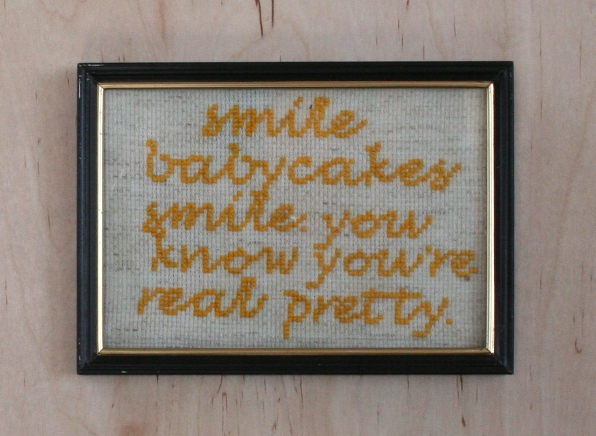Art & Exhibitions
Artist Cross Stitches Catcalls


Lorraine Rubio

At first glance, Elana Adler’s series “You Are My Duchess” embraces the trappings of traditional ideals of femininity—each stitched sample is ornate with delicate lettering referencing the distinctly distaff tradition of cross stitched samplers—but if you take a closer glance you will see that the Brooklyn-based artist has painstakingly stitched lewd catcalls she, and likely many other women have heard throughout any day. While funny at first, any woman reading can recall a range of experiences in which she has been told Mmm I wanna go home with that, Pssssssst Pssssssst Pssssssst Pssssssst Pssssssst, or Can I Take You Home?! by a complete stranger (all are phrases she has stitched in this series). Adler’s series is a poignant criticism of the acceptance of the commonality of sexual harassment drawing on layers of archaic ideals and traditions while resonating with movements such as #YesAllWomen to raise feminist awareness (See “We Asked 20 Women ‘Is the Art World Biased?’ Here’s What They Said“).
“You Are My Duchess” is comprised of 37 pieces of cross stitch in what Adler calls a “hope chest” on her website. Historians Herbert A. Otto and Robert B. Anderson explain that the tradition of the hope chest—filled with decorative needlepoint made by a girl from adolescence onward to show her husband and his family her ability as a potential wife and mother— dates back to the Middle Ages.
The juxtaposition of an outdated tradition with contemporary experiences in the saccharine pastel lettering attaches weight to the commonality of blatant sexism. While the artist takes on the “simple piece of women’s work” (see Adler’s artist website) she simultaneously externalizes the impact of “unsolicited and unwanted attention.” The externalizing element of “You Are My Duchess” is, in ways, similar to the impact of Columbia student Emma Sulkowicz’s performance art piece, Carry That Weight or Mattress Performance (see “Columbia Student’s Striking Mattress Performance“), in reaction to an alleged rape in her dorm bed, and Columbia’s lack of support for her after she made the accusation. Both pieces bring attention to the pervasiveness of sexual assault and the rather lax attitude towards it—in Sulkowicz’s case, she is among a group, a crowd of Columbia students, taking a stand against the school’s unequal treatment of victims and perpetrators of rape and sexual assault.
A selection of Elana Adler’s work will be on view in “Shape Scapes” group show at Calico Gallery in Greenpoint from October 24–November 28.